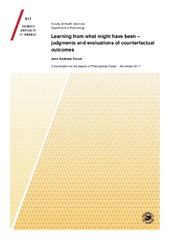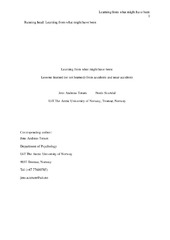| dc.contributor.advisor | Svartdal, Frode | |
| dc.contributor.author | Terum, Jens Andreas | |
| dc.date.accessioned | 2018-04-04T09:02:59Z | |
| dc.date.available | 2018-04-04T09:02:59Z | |
| dc.date.issued | 2018-03-23 | |
| dc.description.abstract | The aim of the present thesis is to contribute to the understanding of how people construct hypothetical alternatives to past events, and further explore the role of such counterfactual thinking in learning from accidents and near-accidents.
In Paper 1 we introduced the notion that counterfactual thinking is a form of mental simulation that relies on abstract, gist based representations of the world, and therefore promotes a focus on schematic and prototypical outcomes. For events with a clear valence, this should lead counterfactual speculations to be more extreme, or unambiguously good or bad, compared to ordinary predictions. In line with our expectation, people evaluated the consequences of an unexpected turn of events to be more extreme, when it was presented as a counterfactual possibility rather than an actual occurrence.
Paper 2 replicated the main finding in Paper 1, and extended the investigation to include affective evaluations. Consistent with the previous finding, participants exaggerated consequence estimates, but affective evaluations indicated an opposite effect: factual events were evaluated as more emotionally impressive than the same events presented as counterfactual, for both positive and negative outcomes. These apparently contradictory findings were discussed within the framework of Construal Level Theory, and it is suggested that both findings are compatible with an abstract, high – level account of counterfactual thinking.
In Paper 3 we investigated learning from accidents and near-accidents. By asking people about their thoughts and feelings following accidents and near-accidents, we examined the degree to which these experiences had inspired caution. The results indicated that accidents inspired more caution than near-accidents. Furthermore, repeated experience with near accidents appeared to have inspired caution, but we observed no change in caution following repeated experience with near-accidents. Learned carefulness did not seem to be associated with reported emotional intensity of the counterfactual outcomes imagined. However, learned carefulness was strongly associated with self-focused upward counterfactuals and the specific emotions of unpleasantness and regret, implicating the role of deliberate reflection. | en_US |
| dc.description.doctoraltype | ph.d. | en_US |
| dc.description.popularabstract | People frequently stop to consider how aspect and events in their life could have been different. We may regret opportunities we failed to seize, or shudder at the thought of what might have happened “If only…”. Such thoughts are purely hypothetical, but still have an impact on how we feel, think and evaluate the world around us. Sometimes, or maybe most times, such thought seem to drift in the direction of outcomes that are the polar opposite of what actually happened. For instance, “If only I had been encouraged to keep playing,,, ” one might think, subtly hinting at a missed career in the music industry, or “It’s a miracle it all ended well“, contemplating the mischief indulged in childhood. In the present thesis, I report on research asking people to evaluate scenarios describing situations that could easily have taken a turn for the better or worse. We show that: 1) such counterfactual speculations seem to be less constrained by reality than ordinary predictions. That 2) such thoughts are affectively unimpressive, and 3) that such exaggerated thoughts about what “could have happened” do not seem to inspire caution after accidents and near-accidents. | en_US |
| dc.description | The papers 1 and 2 of this thesis are not available in Munin. <br>
Paper 1: Teigen, K. H., Kanten, A. B., Terum, J. A.: «Going to the other extreme: Counterfactual thinking leads to polarised judgements”. Available in <a href= https://doi.org/10.1080/13546783.2010.537491> Thinking & Reasoning 2011, 17(1):1–29. </a>
<br>
Paper 2: Terum, J. A., Svartdal, F.: «Judgements vs affective evaluations of counterfactual outcomes”. Available in <a href=http://dx.doi.org/10.1080/13546783.2012.739098> Thinking & Reasoning 2013,19 (1): 78–95. </a> | en_US |
| dc.identifier.uri | https://hdl.handle.net/10037/12468 | |
| dc.language.iso | eng | en_US |
| dc.publisher | UiT The Arctic University of Norway | en_US |
| dc.publisher | UiT Norges arktiske universitet | en_US |
| dc.rights.accessRights | openAccess | en_US |
| dc.rights.holder | Copyright 2018 The Author(s) | |
| dc.rights.uri | https://creativecommons.org/licenses/by-nc-sa/3.0 | en_US |
| dc.rights | Attribution-NonCommercial-ShareAlike 3.0 Unported (CC BY-NC-SA 3.0) | en_US |
| dc.subject | Counterfactual thinking | en_US |
| dc.subject | Impact bias | en_US |
| dc.subject | Construal level | en_US |
| dc.subject | Comparative judgment | en_US |
| dc.subject | Affective forecasting | en_US |
| dc.subject | Near-miss bias | en_US |
| dc.subject | Accidents and Near-accidents | en_US |
| dc.subject | VDP::Samfunnsvitenskap: 200::Psykologi: 260 | en_US |
| dc.subject | VDP::Social science: 200::Psychology: 260 | en_US |
| dc.title | Learning from what might have been – judgments and evaluations of counterfactual outcomes | en_US |
| dc.type | Doctoral thesis | en_US |
| dc.type | Doktorgradsavhandling | en_US |


 English
English norsk
norsk

